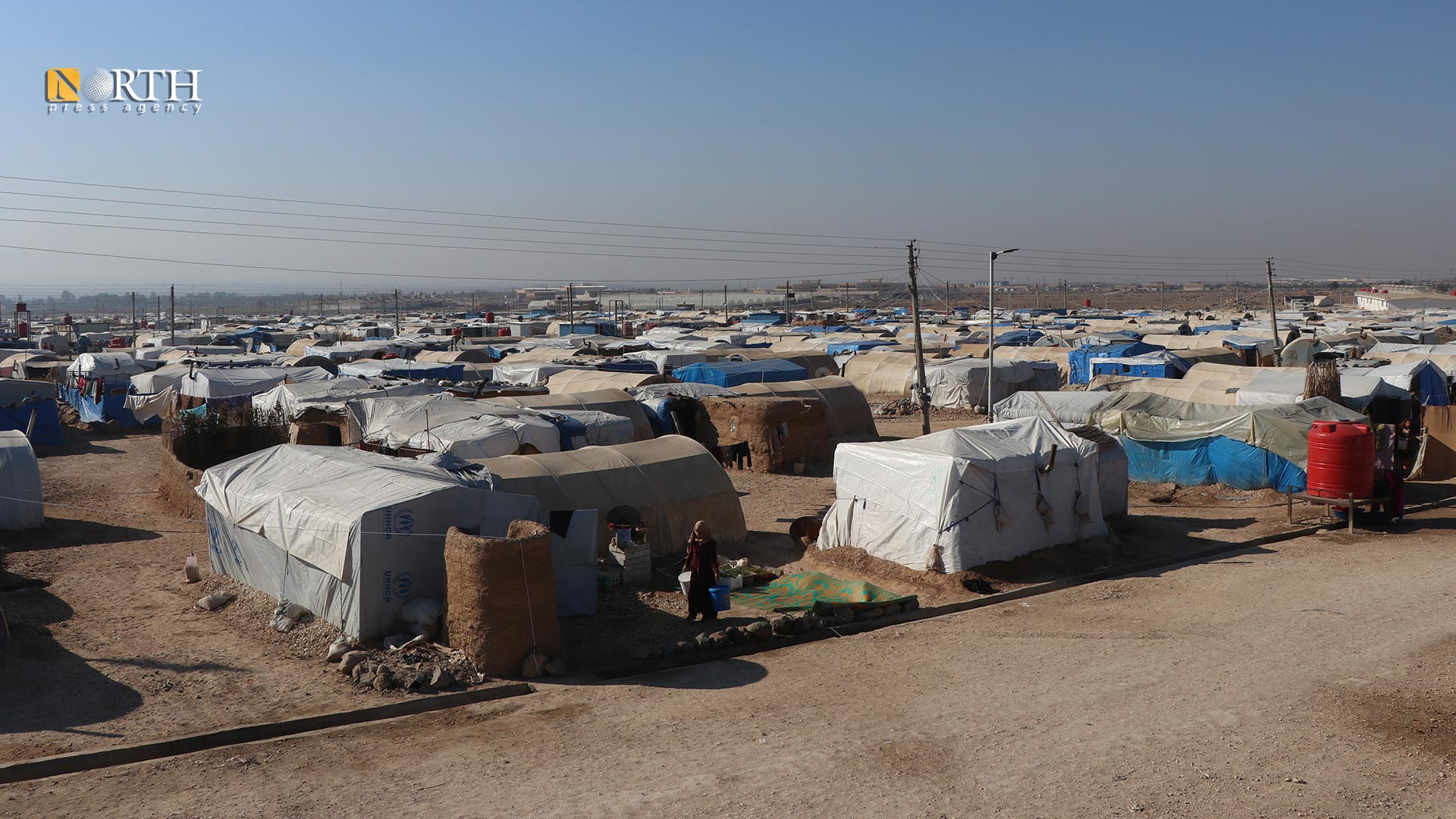HASAKAH, Syria (North Press) – The 53-year-old IDP Torfa Muhammad Bakr sits with her grandchildren under the sunlight in a sector in the Washokani camp close to the town of al-Twaina some 13 km from the city of Hasakah, northeast Syria.
Bakr, who comes from the village of Umm al-Khair in the countryside of the city of Sere Kaniye (Ras al-Ain), depends on rendered aid as her family has no breadwinner or any other resources that could make them earn a living.
Bakr’s situation worsened, especially after her husband Aboud al-Salem, 61, incurred injuries in the arm while their village was under fire from Turkish-backed armed men when they attacked Sere Kaniye (Ras al-Ain) and Tel Abyad in 2019.
In 2019, Turkey, with the support of the Syrian opposition factions, also known as the Syrian National Army (SNA), launched the “Peace Spring” military operation against the cities of Tel Abyad and Sere Kaniye (Ras al-Ain), and it occupied the two cities and displaced their original inhabitants.
Little aid
Bakr, like thousands of other IDPs deployed in camps in northeast Syria, complains about the lack of humanitarian aid in light of the dire economic situation the region is witnessing.
There are tens of thousands of IDPs from Sere Kaniye in the city of Hasakah, northeast Syria, and its countryside in addition to 32.000 IDPs in Sere Kaniye and Washokani camps and 20.000 others in accommodating centers in schools in Hasakah and its countryside.
Bakr’s family consists of seven members, “they give us one or two food parcels per month, which can hardly last 20 days,” she said.
She added that meals to be served for breakfast are not included in the provided rations.
Bakr says it is three years since they received cover-ups for their tents, adding ” we left our home and properties out of fear, we left everything behind.”
She also highlighted that the provided heating oil is not sufficient.
IDPs living in Washokani voice their continued plight without knowing that the ongoing closure of the al-Ya’rubiyah border crossing with Iraq the main artery of life for thousands of people in the region, lies behind their sufferings.
In July 2014, the UNSC adopted Resolution 2165 which authorized the UN to deliver cross-border humanitarian aid to Syria through four crossings al-Ramtha crossing with Jordan, Bab al-Salameh and Bab al-Hawa with Turkey, and Tel Kocher with Iraq, without the consent of the Syrian government.
In January 2020, UN Res. 2504 was adopted which reduced the number of border crossings to only Bab al-Salameh and Bab al-Hawa for six months open to renewal in a special meeting by the UNSC.
Since July 2020, Bab al-Hawa has been the only crossing kept open to UN aid based on Resolution 2533 (2020), while the use of the others was curtailed.
In July 2022, the UNSC approved extending lifesaving aid deliveries into northwest Syria through the Bab al-Hawa crossing for six months.
The closure of the al-Ya’rubiyah (Tel Kocher) border crossing is a blatant politicization of the humanitarian situation in northeast Syria, said Badran Chiya Kurd, co-chair of the Foreign Relations Department of the Autonomous Administration of North and East Syria (AANES) on Jan. 6.
The 39-year-old Tareq Allawi, another IDP from the village of al-Arish in the countryside of Sere Kaniye, could not hold his tears back while comparing his current situation to that he had in his own house he fled in October 2019.
“When you live in a tent after fleeing your own home this is the suffering itself,” Allawi told North Press.
He noted the real suffering endured by most refugees is due to high costs of living, hard living conditions, and lack of rendered aid, ”They provide us with little aid which is short of a family needs.”
Ongoing closure of al-Ya’rubiyah
Barzan Abdullah, the co-chair of the Washokani camp administration, asserted that the closure of the al-Ya’rubiyah (Tel Kocher)border crossing affects the delivery of humanitarian aid.
most “aid coming from regime-held areas, are seized and very little aid is delivered to the region,” Abdullah said.
Abdullah indicated the closure of al-Ya’rubiyah has “immensely” affected the IDPs, especially at the Washokani camp that houses nearly 16.400 IDPs, who “live in dire humanitarian conditions in the camp.”
He emphasizes the necessity of re-opening the border crossing that is considered the artery of life for thousands of IDPs.

